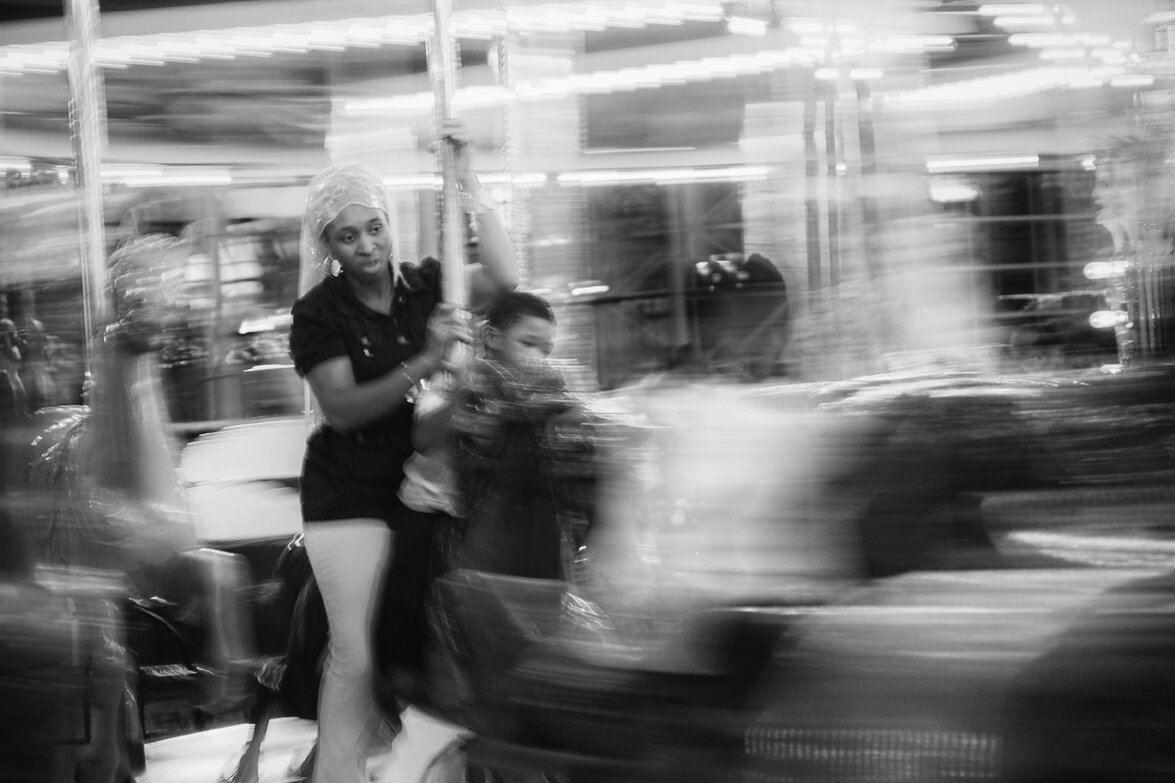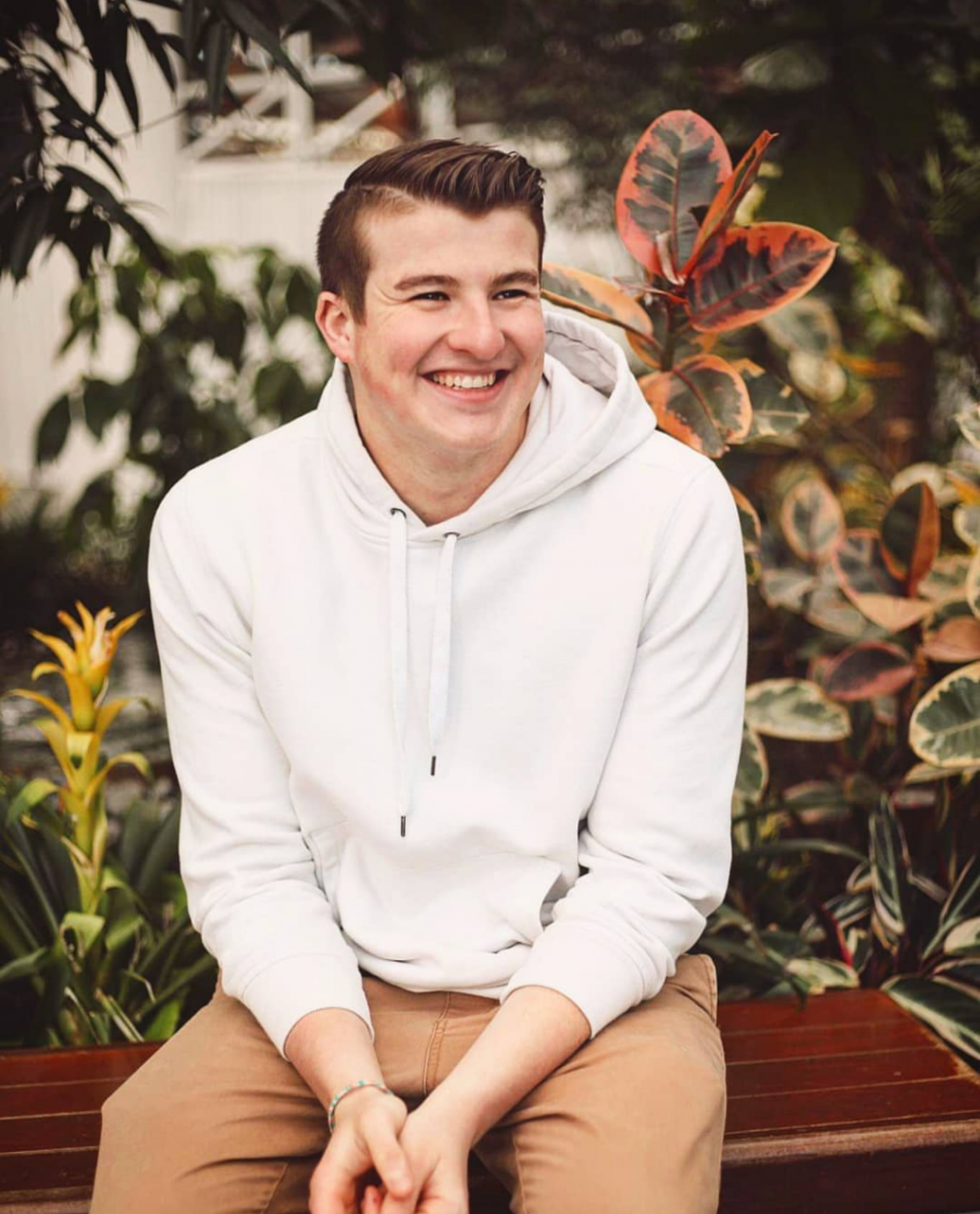The Recessionists: Chapter One
It was a bad way to watch the sunset, idling in the back parking lot of the Mormon Church with a quarter tank of gas and three missed calls from Kate. And it was such a shame, too, because it was just the kind of sunset which Cal loved to watch. A cold sky with curls of pink and orange clouds. The same kind of sky he grew up watching from his deer blind when the evening hunt was truly about to begin. When there was, truly, an exhilaration, a pounding of one’s heart against the immensity of the world. Cal sat in his truck with the radio on. Only a handful of vehicles were in the lot. Mostly rusted Chevys and old Fords with snow tires and bumperstickers reading, “My Kid Beat Up Your Honor Roll Student.” None of the cars were parked next to each other. The closest they came was a full spot from one another. This was odd to Cal because soon enough, every one of those trucks’ drivers would be sitting in a circle on hard, plastic folding chairs with “LDS” sharpied across the back and a Styrofoam cup of coffee squeezed between their hands. But that seemed to be the point, Cal thought, that outside the meeting, these drivers, these people, could maintain their identities, their “me-ness,” which assured them they were what most people called normal. Inside, however, they lost their “me-ness” and, though they were still individuals, still one single organism capable of thought and feeling and joy and pain, they became a part of the circle, giving themselves up—becoming anonymous.
Cal didn’t want that, he wanted to go home to bed. To get enough sleep so he could look for a job the next day and not feel as if he were fighting with a hangover. His meeting with Stacey was in the afternoon and if he had to tell her that he’d just been fired, at least he could show her a handful of job applications. Passed the church, the sun sank behind the tree line, gravity pulling the light across the frost on the farmer’s field. That’s what did it, right? Gravity? Pulling anything and everything, including light and drunks, one way or the other. Pushing the earth in a circle. Maybe that was what Cal remembered learning once. The sun was now only the light it left behind, falling over the edge of the earth like neon-dyed hair over the side of a bed, and here he was wasting gas to keep the heat on.
The church was small with a brown-brick façade and a set of glass double doors. There was a cinderblock wedged between the doors to keep them open. The building wasn’t like any of the other churches in town, no stained glass, no bells. Had it not been for the steeple, which didn’t rise higher than the trees that surrounded it, it could pass as a municipal building or maybe a funeral home. But there were probably far fewer Mormons in Michigan’s Thumb than there were Methodists or Lutherans or even Catholics—so, maybe, Cal figured, they only needed a small church. It was better, anyway, not haughty, which meant that it drew less eye traffic. The perfect place for a weekly Alcoholics Anonymous meeting.
A couple more cars came, the drivers, not hesitating to pop their vehicles in to park and beeline it for the doors. Cal didn’t recognize any of them and felt that maybe miracles were in fact real, but that they were relegated to mundanity. The green numbers on the dashboard clock flashed over to a quarter to seven. Cal had been in the parking lot long enough to have the sharp air cloud his rear windshield and the edges of the windows. The meeting started in fifteen minutes, but Cal didn’t want to get out of his truck. Cal knew what was waiting for him behind those double doors. Folding chairs and burnt coffee. Pity smiles and fake empathy. Fingers peeling at cups and knees pistoning. The circle listening to a Tom or a Jane or a Quentin as they shared the same stories they all shared every week. I promised myself only one drink after work and then woke up next to a toilet.
It would be easy for Cal to leave, to pull his truck out onto the county road and disappear into the snow and dark. If he left now, he would have enough time to call Kate back, see what she wanted. He had to give up his weekend with Jack, but maybe he’d still want to talk to his daddy. Jack was seven, old enough to feel betrayed, but Cal hoped he was still young enough to not know what a grudge was. He couldn’t leave, though. He had to get out of his car and go in because that’s what the judge ordered and what his parole officer enforced. There wasn’t a damn thing he could do about that.
Kate paced through the doorway between the kitchen and the living room, spinning her phone in her hand like a deck of cards. Her ex-husband never answered when she called, but he always called her back within a couple hours. She hated that. He said it was because he was always busy when she called, but no human being was ever that busy, no lines of fate, speeding along time and space, jumping across the numbers of possibilities and the theories of probability finally crossed at the exact moment when Kate called Cal while he was “busy.” Coincidences be damned, Kate thought. She knew he just liked being the one to make the other person answer the phone. It was a power thing. Control for a man without any. This time she had even left him a voicemail, something she never did. The two of them had an understanding, when one called the other, it was important. It was one of the many small things that don’t show up in divorce papers, but, on a level beyond the law, are still binding like sending any kids to the other parent with clean clothes and making sure you’re not late to your ex-in-laws’ funeral. She’d called him three times and if he didn’t know that she meant business, seeing that he now had a voicemail, was sure to feel like a kick to the side of his knee.
There’s a certain kind of fear a body feels at points in their lives. There’s the fear that makes one think that their life is almost up, like what’s felt when the car brakes lock on an iced stretch of I-75 and the only other vehicles around are semis. That’s the exciting fear, a feeling heightened by time running on fast forward and loud noises and too-quick-but-at-the-same-time-too-slow reflexes. That’s the fear that sells movie tickets. Cal didn’t have that fear as he stepped closer to the doors of the Mormon Church. He had the kind of fear that sat inside someone like a pot of coffee and undercooked eggs. The everyday fear of unpaid bills and having lunch with that one coworker who thinks they’re your best friend. Cal felt it gurgling inside him as he pulled himself farther away from his truck. The kind that lingered with someone, the leveling kind that didn’t care what bills a person had to pay or what their credit score was or if the person was still a virgin. Cal knew this fear, he’d felt it only once before when he walked up to the glass window of the maternity ward and looked at his son for the first time. The comparison shamed Cal, but he challenged any man to say, when they saw their child for the first time—no, when they were first told they were going to be a father, that they did feel some kind of weight slosh in their guts, that they didn’t think, Oh, shit. Now what? for even a second. Anyone who said that all they felt was joy was full of it, Cal knew that. Fear knew that. It made everyone equal.
At the church, Cal pulled himself through the crack between the doors and stood on a dirty entryway rug that was soaked with melted snow and mud. He heard someone pulling a chair across tile floor, the little rubber ends squeaking along the wax, and a few voices indistinct from one another. He stomped his boots, trying to knock the snow off them, but only succeeded in splashing himself with the pooled thaw. A hall ran from both ends of the entryway, the lights were off and only a triangle of dusty light came from the end of the left hall. Cal’s pocket buzzed. He reached into it and pulled out his cellphone. Another missed call from Kate. This time she left a voicemail. She only did that when she really needed him for something that only he could provide. The phone said ten past seven and he could hear only one voice now coming from down the hall. He was late.
“Shit,” Cal said, “I don’t have time for this.” He looked down at his phone, then down the hallway. He flipped open his cellphone and went back out in the cold.
Kate owned a home east of Caro on the northern bank of the Cass River, set back from a dirt road a few hundred yards. A small place with two bedrooms and a bath, new vinyl siding and a roof that would last for another fifteen years. She’d bought it off a land auctioneer’s block, and part of her felt guilty for that. But this was her home. She’d put in the time, worked the hours, dealt with the mess and money and headache of being married to a man like Cal and had grown out of it with some idea of what she deserved.
Her phone rang and she answered it before the first ring had finished. It was Cal.
“I saw you called. What’s up?”
“Did you listen to my voicemail?”
“No,” he said, “Figured you could just tell me.”
“That’s the point of a voicemail, Cal.” The man baffled her sometimes.
“Kate, you didn’t call to argue about a voicemail.” Cal had always had a way about arguing—namely, he didn’t do it. Even if she got started with him and even, like now, when she wanted to duct tape his phone to his head with her voicemail playing on repeat, she found that he still knew how to keep to the matter at hand.
“Jack brought a bullet to school.” She didn’t need to waste time hinting at things, or setting the stage for a conversation about their son. Cal hadn’t been the most reliable husband, but anything having to do with Jack made Cal twist his ankles trying to do what he could. So, when Jack’s principal, Kate’s boss, called her down to his office and she found her son sitting with his chin practically glued to his chest and Mr. Berber leaning across his desk with the pointed brass jacket of a 5.56 shell pinched between his forefinger and thumb, she knew that Cal wouldn’t need nor want any sugarcoating.
The line was silent and she could hear him shifting the phone from one ear to the other. She heard him sigh and then the crackling static of wind. He’d just stepped outside from somewhere.
“Well?” She said when the wind died down.
“Can this wait?” Cal said.
“‘Can this wait?’ You’re joking, right?”
“I’m a late for something.”
“Your son. Just brought. Live ammunition. To school,” Kate said. “What part of that isn’t registering with you?”
“I hear ya, Kate,” Cal said, “I do.” He sighed again and Kate could tell he was trying to end the call. “Look, I can come over in, like, two hours. I’m in the middle of something I gotta take care of.” The wind picked up on his side of the line and Kate heard him shifting. His knee was probably killing him.
“Like what?”
“Like something important.”
“Something important?”
“Parole important.”
Kate shook her head and walked to the other side of the kitchen. Down the hallway, she saw that Jack’s door was closed and a sliver of light showed from the bottom of it. He’d been in there since she’d brought him home. Photos hung in the hallway like a timeline connecting his room to hers, the picture of him as a newborn lying next to an ink imprint of his baby feet which hung next to his door, and a framed snapshot of the two of them sitting on a blanket watching that year’s Fourth of July fireworks hung next her door. Cal had paid a frame shop to professionally matte Jack’s diploma from graduating kindergarten and it hung at the end of the hall above a small table with a photo of Cal holding Jack’s hand as they walked across the graduation stage. Kate had to take half a sick day because there was no one to watch him. Cal wasn’t available when she’d called the lumberyard to see if he could take Jack home. She thought about the moments captured in those photos and about the mortgage that she never worried about. She thought about the pen she’d used at the auctioneer’s office, how it bled so strongly, as if it too couldn’t wait to put Kate’s name at the bottom of the deed. She deserved those moments and her 3.95% fixed mortgage rate, but she didn’t deserve this.
“Look,” she said, “That line has run its course with me. Make something work and get here.”
Cal walked in at the tail end of a story told by a big guy with enough muscle to negate the fat around his middle. A tribal tattoo snaked past the frayed hems of his sleeves and down his arms. Had it not been for the man’s face, Cal would have thought he’d have been a tough customer. The man had a boy’s face with thin, cornsilk hair curled on his chin and out from underneath a camo baseball cap. His lips were chapped and he was biting them as he spoke.
“But he don’t wanna see me, and I can’t blame him. I told my mom on the phone one night, I said, ‘Ma, how’s Dad?’ And she just told me he’s been busy hauling sugar beets for Pioneer. I,” the man-boy cracked his knuckles one at a time and shifted his feet on the tile floor. He looked troubled by what he was thinking about saying next, like he had seen someone steal a newspaper from a stand and use it for an umbrella. He didn’t know if it was wrong to share what he was re-witnessing in his mind or if it would just be best to keep it below the surface. “I’m done for tonight. That’s all I wanna say.”
The circle of people thanked him. Jared, they called him. Then, in unison, the faces turned to Cal as he stood in the doorway. A man who was all beard and denim, a shaky older lady, the man who was just talking, and two middle-aged men in overalls shifted enough to face him.
“Welcome,” the denim man said. The older lady coughed and smiled at him, and the overalls leaned over to each other and whispered. Cal cleared his throat and took a seat next to Jared who crossed his arms and grunted through his nose. It was seven thirty, the meeting was a third over, but maybe he could still make that count with Stacey. He just needed to find the person in charge, explain what had happened, and get them to sign his hours sheet.
What was Jack thinking, bringing a bullet to school? Cal thought about the first time he’d taught the boy to shoot, all the rules, the first being, Always treat a gun like it was loaded, and another being, Bullets are just as dangerous. He pictured his son walking the halls of Schall Elementary with that small, almost inconsequential piece of brass loaded down into his pocket. He saw it rolling back and forth between his son’s index finger and thumb, the coolness of it making him smile as he approached the first friend he’d show. He knew what Jack had wanted from this, he wanted to be king of the kids for a day. He wanted his friends to say, “Oh, wow, no way.” He wanted his friends to think he was cool. Cal knew he’d have to stay late to talk all of this through with Jack and that Kate would be a mess, sitting just outside of their son’s bedroom door, holding herself back whenever she heard her ex-husband say something that she disagreed with, Cal wanting to put Jack to bed so he could get at least some sleep. But Cal wouldn’t sleep at all that night, he knew this. He’d rethink everything he’d said to his son and find better, or simply different ways of saying what he’d said. That doubt would clang around his apartment like broken dishes. He’d want to drink and not want to drink, and that tearing inside him would keep him up until the auto-drip on the Mr. Coffee kicked on at six.
Someone coughed and Jared nudged Cal’s shoulder with his elbow. Cal looked up from his coffee. The circle focused on him. Ten sets of eyes, ten noses, ten different stories and reasons and excuses waiting for him to offer his. Cal cleared his throat again. This was what he had practiced for, what he knew was coming. He had the words, knew the answer, My name is Calvin, and I’m. . . but something caught up inside of him, something that kept him from acting and told him to swallow it all down, digest it until it was almost nothing. Was his record seventy-two days sober? Why, how would he know that? What made Cal want to keep track of that? When had that been? Jackson State Prison? Cal looked up to the clock, the meeting still had half an hour to go. Say it, Cal said to himself, say something at least. The boy came back with a Dixie cup of water for the gray woman. She coughed into it and water bubbled over the sides into her lap, her hands shook as she lifted the cup to her lips.
“Hey, man,” the denim shirt said, “Look, you don’t have to testify to God, and we’re not offering you any Kool-aid here, but at least tell us your name.” He leaned forward over his knees, holding a half-full Styrofoam cup.
“My name is,” Cal started. The circle seemed to ring around him, tighter, even the man-boy next to him had uncrossed his arms and was looking toward him. What was his name? Jeffrey? Jeremy? Jared! That was it, a man with a boy’s name, right. But now what was his own name, he thought. Anything, really. He was free to be anyone.
“My name is Ben,” Cal said.
“Hi, Ben,” the circle said. The air vent in the ceiling rattled alive and dust fell from the grating. He slid back from the edge of his chair and lined his spine against the molded plastic. The coffee in his hand smelled fresh and was still warm. Feeling it in his palms, he remembered how cold he had just been while talking to Kate and the explosion of ice he felt in his stomach when she told him about Jack. He sipped the coffee. Somebody had made it the way he’d gotten used to, weak but almost mild. Lukewarm. He knew there were going to be things that, having come back to reality, he’d have to let go, but it killed a part of him to learn that something as seemingly inconsequential as a hot cup of black coffee would be one of them.
“So, Ben,” the man said, “Would you like to share anything else? We’ve got time.” He smiled, and Cal focused on a small scar on the man’s chin. He’d avoided direct eye contact for years, but he knew that the man in denim would be looking right into his if he looked up.
The sound of the double doors clanging came from down the hall, and Cal felt the eyes of the circle fall away. A woman wheeled around the doorjamb and into the room.
“Don’t mind me. Ignore me. I’m late. Yes, I know. I’m so, so sorry to interrupt.” She made straight for the coffee and poured three seconds worth of sugar from its container before pouring the coffee in. Then she turned to the circle, stirring, a large red purse hanging off her shoulder. She grabbed a chair and slid it between Jared and Cal. “Scoot,” she said to them and like a wave at a football game, everyone around the circle inched away from where the woman had chosen to sit. She sat and her purse fell from her shoulder. She caught it in the crook of her elbow, but still sloshed some of her coffee on the floor near Cal’s feet.
“Oh, oh,” she said. She laughed a little. “I’m sorry. So, so sorry.” She tried to mop at the small puddle with her foot. She wore green thong sandals and her toenails had yellow polish.
“No problem,” Cal said.
“Good,” she said. She stopped her attempt to clean the spill and turned to the circle. “What did I miss?” Cal gauged the others. They were used to this woman, this seemed normal for her and to them, but he also saw that they were tired of it.
“Gwen,” the man in denim said, “What are you doing?”
“Attending my meeting, Josh,” she said. She drank her coffee and Cal could smell the sugar cooking in it.
“You interrupted Ben,” Josh said.
“Who’s Ben?” She asked. The circle looked to Cal. “Him? Oh, I’m so, so sorry. He doesn’t look much like the talking type, though.” She winked at Cal from over the rim of the Styrofoam cup. “New guy, then?” She asked. Cal nodded. “See, Josh? What’d I say? Doesn’t look like much of a talker.”
“Gwen, please,” Josh said. He brought his hands up to his lips as if he were praying to the woman to save him from herself.
“I’m just playing,” she said. “Go ahead, Ben.”
There were only twenty minutes left for the meeting and Cal didn’t want a second of it. He needed to be home, or at least at Kate’s home to talk to Jack who, by now, was probably getting ready for bed.
“I don’t really have much to say tonight,” Cal said. Josh let his head drop and Cal could see through the thinning brown hair swirled at the top of his head. He had a tattoo right smack on the top of his head, but Cal couldn’t make out what it was.
“Not a problem, Ben,” Josh said. He lifted his head and smiled around the circle. “Does anyone else have—”
“My roommate is a total bitch, and I fucking hate her.” The circle zoomed their gaze over to Gwen. She drank her coffee and crossed then uncrossed her ankles. She leaned forward and tapped her toes.
“Could you please take this seriously,” the old woman said. Her hands shook, but her voice was clear, although a little burnt from years of cigarettes and probably a few other things. She pulled her cup to her mouth, and the cracked yellow of her fingernails shone like tiny headlights against the white of the Styrofoam.
“You all know me,” Gwen said.
“That’s not the point,” Josh said. “It’s about sticking to the routine, going through it step-by-step.” He closed his palms together again. The clock seemed to have stopped.
“Fine,” she said. She leaned back against the chair, her eyes level with Cal’s. She winked at him. “Hi, everyone, my name is Gwen.”
“Hi, Gwen,” the circle said. Cal came in a half second later than the rest and his was the last voice heard. “Got a timid puppy here, don’t we?” She said.
“Gwen,” Josh said, “You were going to tell us about your roommate—again.”
“Right,” Gwen said. “She’s a bitch. I hate her.” She drank her coffee. The circle stared anywhere but at her.
“Is that all?” Josh asked.
“What? Oh, so, so sorry. I got literally no sleep last night and coffee is taking up a lot of my brain power right now. So, no, that’s not all. My roommate is this girl I knew from college. She has her space, I have mine, the rent gets paid on time. Everything should be easy peasy, right?” She handed her coffee to Cal and began waving her hands as if she were directing traffic. “Well, it isn’t easy. My roommate likes to entertain. Likes to invite all the people we used to run with at school. She likes to drink. Hell, I like to drink, too. That’s why I’m here, duh. But this chick, I tell you, she’s a fish. No, you know what? She’s a whole school of fish. She knows my situation and you all told me I should talk to her about how it makes me feel, what kind of spot it puts me in. I did, and you know what happened?” The circle was quiet. They’d heard this story before, Cal saw. Gwen saw it, too, but it was her time to speak and this was on her mind. She wanted them to listen. She grabbed her coffee back, downed it and began peeling the Styrofoam, spinning a white ribbon from it.
“What happened?” Cal asked. She put a hand on his thigh.
“She cracked a beer and told me I could have one if I wanted.”
“That’s it?” Cal asked.
“That’s a lot,” Gwen said. “It’s almost too much.” She removed her hand and went for more coffee.
“Gwen,” Josh said, “What did we say about removing ourselves from any toxicity? Like Jared here, he knows his relationship with his dad, knows how fighting with him makes him feel even after he tried to make amends so he doesn’t see his father. Is it easy? No.”
“Not a bit,” Jared added.
“Right,” said Josh, “But it’s something we have to do. Not just for ourselves—”
“But for who?” Gwen said. “‘For those we owe it to?’ Is that what you were going to say?” She lifted herself to the counter and sat, tapping her heels gently against the cupboard door.
“It’s for everyone’s benefit, Gwen,” Josh said.
“Remove myself from the toxicity, huh? Then what? Where will I live? You got a spare room, Josh? Gloria, willing to share your single-wide with me? Anyone here a banker? Got a mortgage you could, I don’t know, give me?” She jumped down, slamming her feet onto the tiles.
The circle had nothing to say. Gwen grunted at them.
“I didn’t think so,” she said.
The clocked ticked over to eight and the circle rose.
“Well, that does it for tonight,” Josh said. “Let’s bring it in, give each other some love.” He held his hands out to his sides, taking in Jared’s and Gloria’s, the old woman, who was still shaking from the hands up. A coffee stain had spread along the tile below her chair. Cal knew those shakes. Gloria needed a drink.
Gwen laced her fingers through Cal’s and squeezed. Cal wanted to ignore it, everyone else had merely cupped their hands, but it seemed from his twenty-five minutes of watching Gwen fill the room, of her making it loud and quiet in the space of a single breath, that this would be something she’d do. She’d weave her hands into a stranger’s and believe that’s where she always belonged.
“Alight, one more time, with feeling,” Josh said. The circle shook as it inhaled, but in that moment between breath and prayer, Gloria began to cough. She dropped Josh’s hand and tried to cover her mouth and it was that connection to him that proved to be her anchor. She listed forward and fell, her head cracking against the floor. On her other side Cal still held her hand and at first, he and everyone else in the circle for that matter, thought that she had slipped on the coffee she had been spilling all evening. But she kept coughing and before the switch flipped in anyone’s head, the one that told them that they should be doing something, Gloria began to shake.
“Someone call 9-1-1, I think she’s having a heart attack,” Cal said. He knelt next to her still holding her hand. The woman squeezed his hand and stared into him, she looked as if she were drowning. One of the men in overalls had an operator on the phone and was telling them to hurry, that someone was hurt, that someone was dying. Josh crouched on the other side of Gloria.
“I don’t think it’s a heart attack,” he said. “I think it’s a stroke.”
“What if it’s a seizure?” Jared asked. Josh grabbed Gloria’s coat from the back of her chair and laid it over her. Her face was chalk, her eyes pushed at the corners of their sockets and tears ran down to her lips.
“Get her some water,” an overall said.
“No, prop her feet up,” said the other.
“Keep her head elevated,” Jared said, “And don’t let her hit it on anything else.”
“Get out of the way,” Gwen said. She pushed the men away and rolled Gloria onto her side, peeling her grip from Cal’s hand. He hadn’t realized that Gwen had pulled away from him, his hand was still cold from hers. Gwen pried open Gloria’s mouth and fished into it.
“She’s choking on vomit and her tongue,” Gwen said. Gloria shook and closed her mouth on Gwen’s finger. “Goddammit, you idiot,” Gwen said. “I’m trying to save you.” She pulled her hand away and a stream of coffee bile spilled out onto the floor around the feet of the men. “Here,” Gwen said. She grabbed Jared’s hand and propped it against the small of Gloria’s back. “Keep her on her side.” She pointed to one of the overalls. “Get your ass outside and flag down the ambulance. Everyone back up and let her breath a bit.”
Gwen lifted herself from the woman and rushed to the sink. She filled a cup with water and came back, dabbing some of the water across Gloria’s forehead with the hem of her sweater. The woman had stopped shaking almost as quickly as it had taken her to fall. Gwen rested the woman’s head in her lap. She was breathing, but almost too softly.
“It’s alright, Gloria. Shh.” Gwen held onto the woman and brushed her hair away from her face.
The ambulance pulled onto the icy road, its orange and red lights dancing across the trees and the snowdrifts along the shoulders. Two trucks pulled out and headed the opposite direction into the darkness. Cal felt his phone vibrate in his pocket. It was almost nine. Between five missed calls and two voicemails, all from Kate, there was a text. If you think im just forgetting about this, youre mistaken. Kate, Jack, the bullet, the fact that Cal was supposed to be with them trying to figure out why, for God’s sake, his son would do such a thing came back to him. At his truck, he watched wisps of snow ramp off his windshield. He thought of how Gloria looked as she choked on every breath, how she grasped his hand as if he could pull her out of herself and save her, as if he knew what to do in a time of crisis.
“Can I bum a ride?” Gwen came to the front of the truck and held out her hand. “I got chomped pretty good.”
“Putting your finger in her mouth was pretty stupid,” Cal said.
“Stupid only because I got bit. But wouldn’t it have also been stupid to, I don’t know, pat her back like a baby or slap the back of her head? Wouldn’t it have been stupider still to let her choke to death?”
“Well, when you put it that way. . . .”
“That’s the only way to put it,” she said. “She ain’t got rabies. I won’t turn into a zombie. If you can help somebody, do it.” Cal’s phone vibrated again. Josh came out of the double doors, locking them. He waved to the two of them.
“I have some place I need to be,” Cal said. “Can’t he take you?”
“No way in hell I’m getting in a car with that guy again,” she said. “You fuck a man once and they think they own you.” She circled over to Cal’s passenger side. “And what did I just say about helping people?” She opened the door and sidled in. Cal followed and started the truck.
“Persuasive, eh?” He said.
“The bloody finger wrapped in a windbreaker helps, I think,” she said. “I’m filled with those little grains of gold.” She curled her arm into the bend of Cal’s elbow and the two watched as the circle broke apart into individual lives once again. “Of course, you gotta filter through all the grains of salt, to get to it sometimes.”
“Are you telling me you’re a liar?” Cal slid is hands into his pocket and felt Gwen squeeze him at his elbow.
“We’re all liars, Ben. C’mon, the sooner you get me to the hospital, the sooner you can get back to your life.”
RS Deeren is a writer from Caro, Michigan where he’s worked as a line cook, a lumberjack, a landscaper, and a bank teller. His fiction is influenced by these and other odd jobs that sustained him during and after the Recession. An Advanced Opportunity Program Fellow in the English PhD program at UW–Milwaukee and a graduate of Columbia College Chicago’s Fiction MFA program, Deeren’s work has appeared in Rosebud Magazine, Joyland, Midwestern Gothic, Great Lakes Review, and in the anthology Tales of Two Americas: Stories of Inequality in a Divided Nation(Penguin Random House, 2017). He can be contacted at www.rsdeeren.com.










